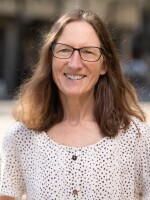The University of Oregon has been chosen as a hub to study post-fire landslides, hurricane-induced flooding, and related natural disasters. It’s part of a five-year, $15 million National Science Foundation grant that was recently announced.
UO Professor of Earth Sciences Josh Roering is a co-leader of the new Center for Land Surface Hazards. In the past, he said, experts in these areas worked independently, and on smaller studies.
“We’re really trying to take an integrated approach to this, and an interdisciplinary one," he said. "It really takes a village of scholars to come together and bring their expertise in these different processes to understand how they collectively shape and alter the Earth's surface and put people at risk.”
Roering said collaborating makes sense, because after a wildfire, for example, an area may also see erosion and impacts to downstream areas. The new center aims to produce tools, such as dashboards with adaptable maps, to help better predict and deal with inter-related disasters.
He said the grant comes at a time when the country is seeing, “damage to infrastructure and loss of life at an increasing pace.”
According to Roering, the research will focus on four locations, each with a different environment and hazards: Puerto Rico, Kentucky, Southern California, and Alaska.
The University of Michigan, Berkeley, and the University of Southern California are also part of the Center, along with other academic and non-academic partners.




